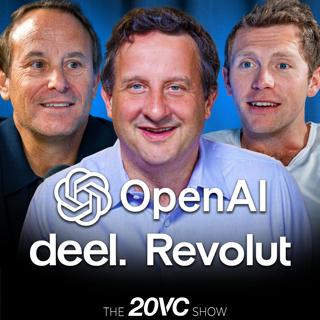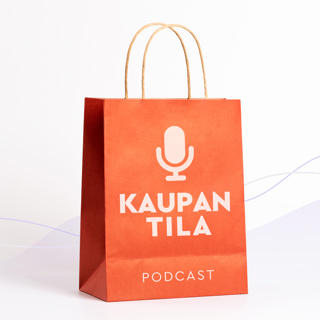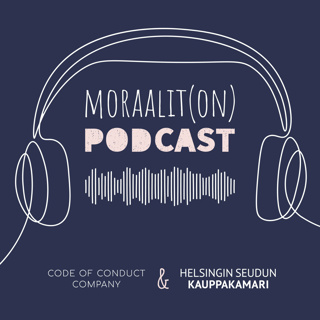
20VC: Foundation Models are the Fastest Depreciating Asset in History, Lina Kahn is a Threat to American Capitalism, PE is Not Coming to Save the M&A Market & How China Could Overtake the US in the AI Race with Michael Eisenberg
Michael Eisenberg is a Co-Founder and General Partner @ Aleph, one of Israel's leading venture firms with a portfolio including the likes of Wix, Lemonade, Empathy, Honeybook and more. Before leading Aleph, Michael was a General Partner @ Benchmark. In Today's Show with Michael Eisenberg We Discuss: 1. The State of AI Investing: Why does Michael believe that "foundation models are the fastest depreciating asset in history"? Are we in an AI bubble today? As an investor, what is the right way to approach this market? Who will be the biggest losers in this AI investing phase? Where will the biggest value accrual be? What lessons does Michael have from the dot com for this? 2. Where Is the Liquidity Coming From? Why does Michael believe that it is BS that private equity will come in and buy a load of software companies and be the primary exit destination? Why does Michael believe that IPO windows are always open? Should founders go out now? What is good enough revenue numbers to go out into the public markets? Why does Michael believe that Lina Kahn is a threat to capitalism? How does Michael predict the next 12-24 months for the M&A market? 3. AI as a Weapon: Who Wins: China or the US: Does Michael agree with the notion that China is 2 years behind the US in AI development? Does Michael agree that AI could be a more dangerous weapon in wars than nuclear weapons? Why does Michael suggest that for all founders in Europe, they should leave? US, China, Israel, Europe, how do they rank for innovating around data regulation for AI? 4. Venture 101: Reserves, Selling Positions and Fund Dying: Why does Michael only want to do reserves into his middle-performing companies? What framework does Michael use to determine whether he should sell a position? Which funds will be the first to die in this next wave of venture? Why does Michael not do sourcing anymore? Where is he weakest in venture? Why does Michael believe that no board meeting needs to be over 45 mins?
19 Kesä 202456min

20VC: Index's Danny Rimer on Investing Lessons from Hits like Figma, Discord and Etsy to Missing Snapchat, Airbnb, Facebook & Spotify | Why Valuation is a Trap and Market Sizing, Signalling and Sector/Geo-Specific Funds are all Noise
Danny Rimer is a Partner @ Index Ventures and one of the most prominent VCs of the last two decades. Danny has led Index to be one of the top global firms on both sides of the Atlantic. Among Danny's incredible portfolio, he has led or been involved with Figma, Discord, Dream Games, Etsy, Glossier and Patreon. In Today's Discussion with Danny Rimer We Cover: 1. The Biggest Lessons from Missing Snap, Airbnb, Spotify and Facebook: How did Danny miss investing in Brian Chesky and Airbnb when Brian says "Index is the best investor that Airbnb never had"? What was Danny's biggest takeaway from turning down Daniel Ek and Spotify multiple times? Why did Danny turn down the chance to invest in Facebook at $10BN? What did he learn from this? Why did Index not lead Snapchat's Series B? How did that decision change Danny's mindset towards the concentration of positions in a fund? 2. The Biggest BS Rules in Venture: Market Sizing, Valuations and Signalling Why does Danny believe that "valuation is a mental trap"? Why does Danny believe that TAM is "noise" and should not be used to assess an investment? Why does Danny believe that stage, sector and geo-specific funds are BS? Why does Danny believe there are no IPO windows? Are IPO markets always open to the best? Why does Danny believe that signalling is BS and does not exist today? 3. Lessons from the Biggest Wins and Losses: What are Danny's biggest lessons from Index's $BN win in King (Candy Crush)? How did the Discord deal come to be? What are Danny's biggest takeaways from it? What are Danny's biggest reflections from losing 10s of millions on Nasty Gal? What is Danny's biggest advice to a new investor today? 4. Lessons from Two Decades Building Index into a Premier Firm: What specifically has Index done to enable them to do what no one else has done and win on both sides of the Atlantic? How did the Benchmark partnership shape much of how Danny has constructed Index today? Who does Danny view as Index's biggest competition? How has it changed with time? Why is Danny more bullish than ever on the UK despite Brexit?
17 Kesä 20241h 13min

20Product: Loom CPO Janie Lee on Three Core Skills that Make the Best PMs, How to Find, Pick and Train the Best PM Talent and Lessons from OpenDoor and Rippling on Product Breadth, Pricing and Talent Density
Janie Lee is the Head of Product and the owner of the Self-Serve business at Loom. Janie previously worked at Rippling, leading the Identity Management and Hardware teams. Prior to that, she worked at Opendoor launching markets and developing pricing algorithms. During this time, Opendoor scaled from 2 to 20+ markets, $5B+ revenue, and 1500+ employees. In Today's Episode with Janie Lee We Discuss: 1. Inside the Product Building Machine of Rippling and Opendoor: What are Janie's single biggest product lessons from Rippling? How do they build so much product so fast? Can you have breadth and high quality? What are Janie's biggest lessons from Opendoor on talent and pricing? What does Janie know now that she wishes she had known when she started her product career? 2. What Makes a Truly Great PM: What core skills do the best PMs have? What is the difference between good vs great? Writing: What are Janie's biggest pieces of advice to PMs who want to write better? Communicate: How do the best PMs and product leaders communicate with their teams? Question Asking: How do the best PMs ask questions of their team and other orgs? 3. How to Find and Pick the Best PMs: How does Janie structure the interview process when hiring new PMs? What questions should one ask in every interview with a PM? Does Janie do a case study? What is she looking to achieve from it? How do the best do? What are Janie's biggest mistakes in hiring PMs? How did she change from it? 4. Onboarding PMs and Crushing Product Reviews: What do the first 30 days look like for new PMs? What are the biggest signs that a new PM is not going to work out? How does the product review process work at Loom? How does Janie prioritise when there is so much volume and data? How has AI changed the way Loom builds products today?
14 Kesä 20241h 2min

20VC: Scale's Alex Wang on Why Data Not Compute is the Bottleneck to Foundation Model Performance, Why AI is the Greatest Military Asset Ever, Is China Really Two Years Behind the US in AI and Why the CCPs Industrial Approach is Better than Anyone Else's
Alex Wang is the Founder and CEO @ Scale.ai, the company that allows you to make the best models with the best data. To date, Alex has raised $1.6BN for the company with a last reported valuation of $14BN earlier this year. Scale tripled their ARR in 2023 and is expected to hit $1.4BN in ARR by the end of 2024. Their investors include Accel, Index, Thrive, Founders Fund, Meta and Nvidia to name a few. In Today's Show with Alex Wang We Discuss: 1. Foundation Models: Diminishing Returns: What are the three core pillars that can meaningfully improve foundation models performance? Why is data the single largest bottleneck to the performance of models today? What data do we need to capture that we do not currently, that will have the biggest impact on model performance moving forward? Will we see the largest companies in the world revert back to on-prem with the increasing security challenges of migrating all customer data to foundation models? 2. AI: A Military Asset in Global Conflict: China + Russia Why does Alex believe that AI has the potential to be an even more powerful military asset than nuclear weapons? If this is the case, should we have open systems? Do we not have to have closed systems? Why does Alex believe that the CCP's approach to industrial policy is better than anyone else's? How does Alex evaluate the rise of Chinese EV car manufacturers in the last few years? Does Alex really believe that China is two years behind the US in the AI race? 3. "I Get Fairer Treatment in Congress than in the Press": Why does Alex believe that the best PR is no PR? Why does Alex believe that he got fairer treatment in congress than he does in the media? Why does Alex believe that all founders should look to own their own distribution channels today? 4. Alex Wang: AMA: What are some of Alex's biggest lessons from Patrick Collison on the impact that a hot company brand has on the ability for that company to hire the best? Does Alex think Trump is going to win? What would be the impact if he were to? Why does Alex believe that enterprise software will be changed forever in the next few years? What question is Alex never asked that he thinks he should be asked?
12 Kesä 202459min

20VC: Reid Hoffman on Foundation Models: Who Wins & How Do Incumbents Respond | The Inflection AI Deal: How it Went Down | Why Trump is a Threat to Democracy | The Future of TikTok | Lessons from Sam Altman, Brian Chesky and the OpenAI Board
Reid Hoffman has been one of the most impactful people in technology over the last two decades. He is the Co-Founder of Linkedin (acq by Microsoft for $26BN) and Co-Founder of Inflection.ai. As an investor, Reid has backed the likes of Facebook, Airbnb, Zynga and more. Reid is also a Board Member @ Microsoft and was on the board of OpenAI. In Today's Show with Reid Hoffman We Discuss: 1. Foundation Models: Commoditisation, Business Models, Incumbents: Does Reid believe we are seeing the commoditization of foundation models? Is it too late for new foundation models to be born today? Are they VC backable? How will foundation models eventually make money? What will be the sustainable business model? Does Reid believe that foundation models will be acquired by large cloud providers? Who goes first? 2. Inflection & Microsoft: What Went Down: How did the Microsoft and Inflection deal go down? Did Satya call up one day and make it happen? With the decay rate of models, Microsoft did not do it for the models, so why did they do it? Was Inflection a sustainable business in it's own right? Does this not prove that to win at this game, you have to be an incumbent with incumbent cash? 3. OpenAI: Board, Lessons and Management: What are 1-2 of Reid's biggest lessons from being on the OpenAI board with Sam? Why did Sam ask Reid in front of the whole company if Reid would fire him if he did not perform? Scarlett Johannsen, super alignment team quitting, NDAs tied to equity, this is a lot in a short amount of time, how does Reid analyse this? 4. Trump is the Biggest Threat to Democracy: What Lies Ahead? Why does Reid believe that Trump is a threat to democracy and evil? What were Reid's biggest takeaways from a two hour lunch with Joe Biden? How does a Trump administration change the world of AI, technology and startups? 5. The Future of TikTok: Is TikTok a threat to US democracy? Should it be banned? What will be the outcome of the current judicial process? Will they sell to a US entity? How could Trump impact the future of TikTok in the US? 6. Reid Hoffman: AMA: What are Peter Thiel's biggest strengths and weaknesses? I believe Mark Zuckerberg is one of the most unappreciated public market CEOs, what are the core components that Reid believes makes Mark so special? How did Reid miss out on investing in SpaceX's first round? What did he not see that he should have seen? What do we think is crazy today but will be a no brainer and very normal in 10 years?
10 Kesä 20241h 15min

20Sales: How Rippling Built Their Sales Machine: How to Hire, Train and Manage the Best SDRs, What is the Right Comp Package for Sales Teams & The Playbook to Start and Scale Your SDR Team
Ashley Kelly is the VP of Global Sales Development at Rippling, the all-in-one platform for HR, IT, and finance. Before Rippling, Ashley played a crucial role in scaling Brex's outbound sales from $2M to over $300M in ARR, and has hired over 800 SDRs during her time in some of the best tech companies in Silicon Valley, including Lever and Zenefits. In Today's Episode with Ashley Kelly We Discuss: From NASCAR to Silicon Valley SDR How did Ashley make her way into the world of sales? Why does Ashley think the best AEs and leaders start off as SDRs? What is Ashley's advice to new SDRs starting their jobs today? Age of AI: Is SDR Outbound Dead? Does Ashley agree that outbound is dead today? Is SDR dead? How will AI change SDR? Why is Ashley hesitant to adopt AI? Why does Ashley think founders should always build the first sales playbook? What did Ashley mean by SDR is the 3rd pillar between sales and marketing? What does Ashley think most companies get wrong about outbound? SDR Hiring: Who, What, When & How When does Ashley think founders should hire their first SDR? How does Ashley structure the hiring process? What questions does she ask? What profile does Ashley look for when hiring for an SDR? How does Ashley structure the finance package? How is it different for each team? Why did Ashley avoid hiring SDRs with SDR experience? Why has she changed her mind? What was Ashley's biggest hiring mistake? What were her takeaways? Onboarding New SDR Hires How does Ashley onboard new SDR hires? What is her onboarding timeline? How does Ashley set targets for new hires? When should they be fully productive? When does Ashley know if a new hire isn't working? What are common traits among Ashley's most successful hires?
7 Kesä 202453min

20VC: Perplexity's Aravind Srinivas on Will Foundation Models Commoditise, Diminishing Returns in Model Performance, OpenAI vs Anthropic: Who Wins & Why the Next Breakthrough in Model Performance will be in Reasoning
Aravind Srinivas is the Co-Founder & CEO of Perplexity, the conversational "answer engine" that provides precise, user-focused answers to queries. Aravind co-founded the company in 2022 after working as a research scientist at OpenAI, Google, and DeepMind. To date, Perplexity has raised over $100 million from investors including Jeff Bezos, Nat Friedman, Elad Gil, and Susan Wojciki. In Today's Episode with Aravind Srinivas We Discuss: Biggest Lessons from DeepMind & OpenAI What was the best career advice Sam Altman @ OpenAI gave Aravind? What were Aravind's biggest takeaways at DeepMind? How did DeepMind shape how Aravind built Perplexity? What did Aravind mean by "competition is for losers?" What did he learn about talent assembly at DeepMind? The Next AI Breakthrough: Reasoning Does Aravind think we are experiencing diminishing returns on compute & model performance? Does Aravind agree reasoning will be the next big breakthrough for models? What are the reasons Aravind thinks models suck at reasoning today? What is the timeline for reasoning improvement according to Aravind? What does Aravind think are the biggest misconceptions about AI today? Will Foundation Models Commoditise? Does Aravind think foundation models will commoditise? What will the end state of foundation models look like? Why does Aravind think the second tier models will get commoditised? Why does Aravind think the subscription model will not work for AI models with true reasoning? Why does Aravind think the application layer companies will benefit from foundation models commoditising? Why does Aravind think foundation models will not verticalize? When does Aravind think is the right time to go enterprise? What is his strategy to differentiate Perplexity from its competitors? AI Arms Race: Who Will Win? Who does Aravind think will be the winners of foundation models? What do AI companies need to do to win the model arms race? How does Aravind think startups can compete against incumbents' infinite cash flow? What are the reasons Aravind thinks Perplexity's browsing is better than ChatGPT? What is Aravind's biggest challenge at Perplexity today?
5 Kesä 202455min

This Week in SaaS: PluralSight Goes to Zero, Salesforce and Mongo Hit Hard, The Next IPO Candidates and How Do We Solve the Problem of Liquidity in Venture Capital
Jason Lemkin is one of the OG SaaS investors with all of his first five investments turning into unicorns with Pipedrive, Algolia, Talkdesk, Salesloft and RevenueCat all in his portfolio. SaaStr is the largest global community in SaaS and he has taught a generation the fundamentals of SaaS on saastr.com. In Our First Ever Episode of This Week in SaaS 1. PluralSight Goes to Zero: WTF happened to PluralSight? How did it go from $3.5BN to $0? Will this have a wider impact on the willingness of PE to buy tech companies? Who are the next contenders to go from hero to zero? Zendesk? Anaplan? Will this generation of PE funds be let off by their LPs for a poor vintage? 2. Salesforce's Worst Stock Market Drop Since 2004 + Mongo Takes a 23% Hit: Why did Salesforce lose $50BN of market cap in a single day? Is the same true for MongoDB taking a 23% hit in one day? What does it mean when the new normal is these once hyper-growth companies now growing only 6% per annum? 3. The Settlers into Slow Growth: Why does Jason believe that Dropbox and Box have both settled into a world of slow growth? What happens to Twilio from here in a world post Jeff Lawson? What happens to Retool from this point on? Would Jason be a buyer of Notion at $10BN? 4. Venture Capital is Broken: Why does Jason believe that we need to see a relation of public multiples for the math in venture capital to work again? Why does Jason believe that the way we mark portfolios with TVPI leads to corrupt and bad behaviour? How does Jason think we will solve the problem of liquidity with IPOs being shut, M&A being out of the window and now PE being a doubt as the source of buyers?
3 Kesä 20241h 9min






















